Perceived Business Writing Proficiency of LGU Employees in Philippines
VerifiedAdded on 2021/06/15
|33
|8050
|25
Report
AI Summary
This research paper investigates the level of business writing proficiency as perceived by Local Government Unit (LGU) employees in Rosario, La Union, Philippines, and their supervisors. Utilizing the Input–Process–Output model and a survey questionnaire, the study examines eight competencies in business writing and demographic data. The findings reveal significant variations between the perceived proficiency levels of LGU employees and their supervisors, highlighting a need for improved communication strategies. The report includes a literature review emphasizing the importance of effective communication skills in the workplace and explores the challenges faced by employees in expressing themselves in English. It also provides recommendations for enhancing business writing proficiency, such as implementing training programs to improve employee communication skills, and suggests ways to improve employee performance and productivity within the LGU.
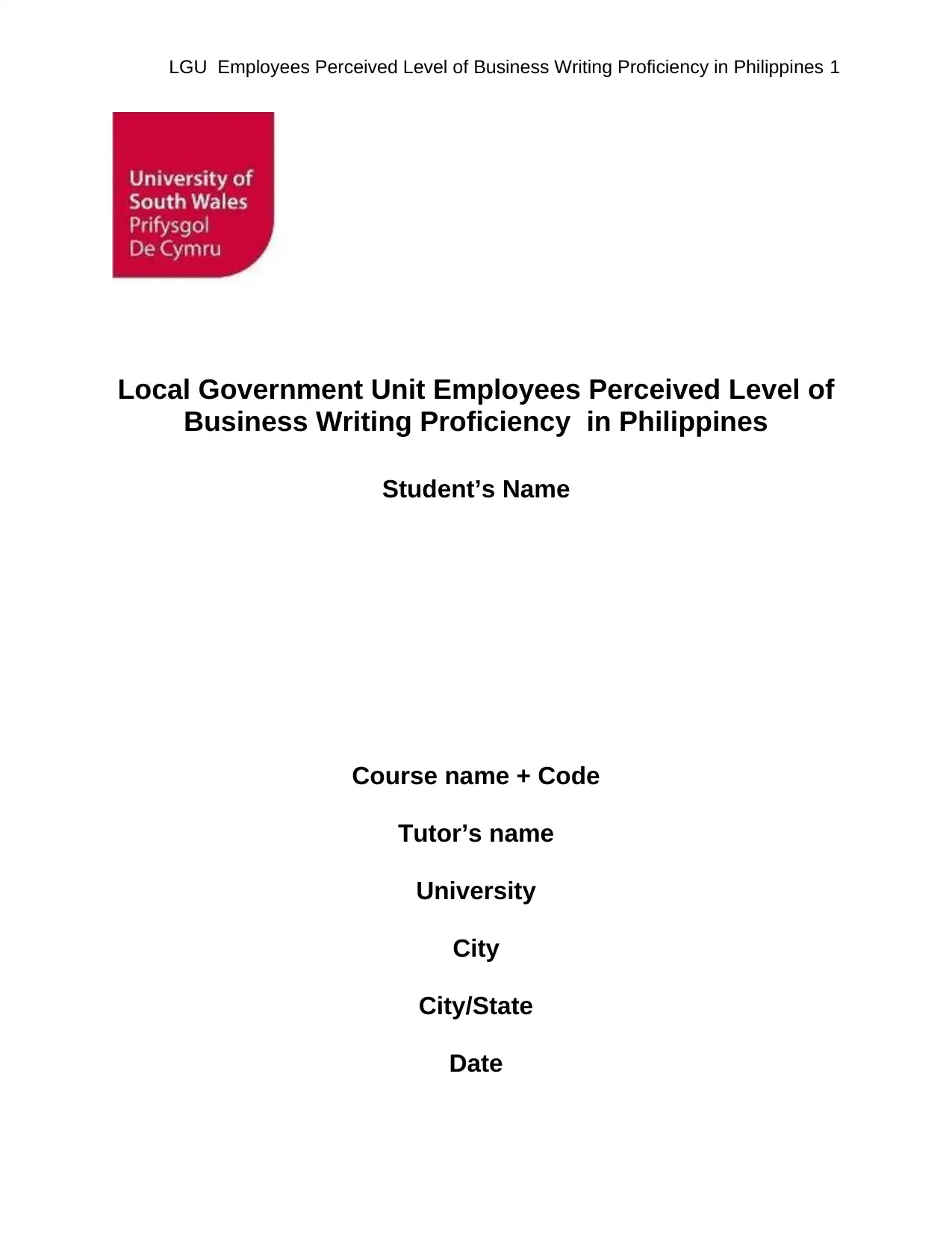
LGU Employees Perceived Level of Business Writing Proficiency in Philippines 1
Local Government Unit Employees Perceived Level of
Business Writing Proficiency in Philippines
Student’s Name
Course name + Code
Tutor’s name
University
City
City/State
Date
Local Government Unit Employees Perceived Level of
Business Writing Proficiency in Philippines
Student’s Name
Course name + Code
Tutor’s name
University
City
City/State
Date
Paraphrase This Document
Need a fresh take? Get an instant paraphrase of this document with our AI Paraphraser
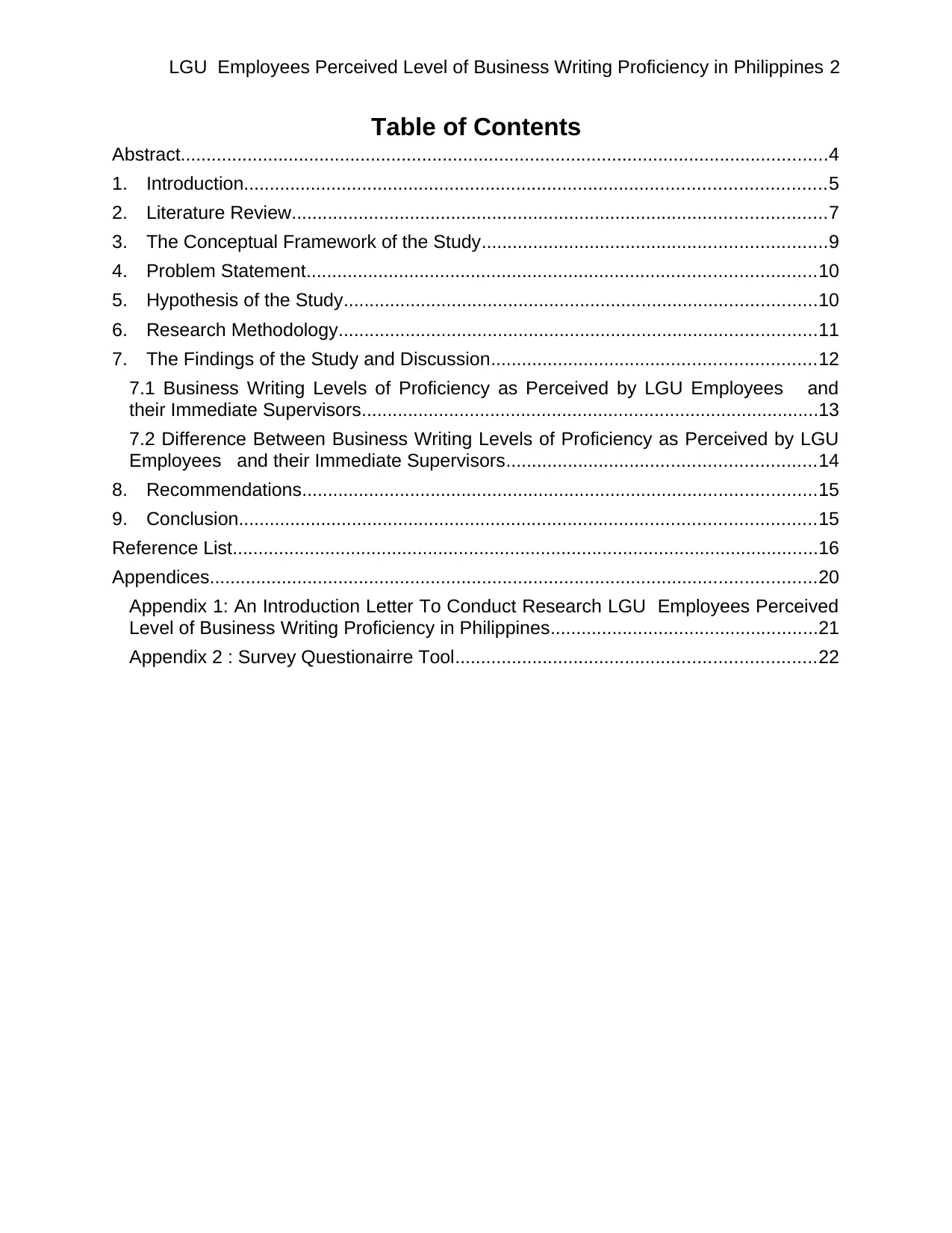
LGU Employees Perceived Level of Business Writing Proficiency in Philippines 2
Table of Contents
Abstract..............................................................................................................................4
1. Introduction.................................................................................................................5
2. Literature Review........................................................................................................7
3. The Conceptual Framework of the Study...................................................................9
4. Problem Statement...................................................................................................10
5. Hypothesis of the Study............................................................................................10
6. Research Methodology.............................................................................................11
7. The Findings of the Study and Discussion...............................................................12
7.1 Business Writing Levels of Proficiency as Perceived by LGU Employees and
their Immediate Supervisors.........................................................................................13
7.2 Difference Between Business Writing Levels of Proficiency as Perceived by LGU
Employees and their Immediate Supervisors............................................................14
8. Recommendations....................................................................................................15
9. Conclusion................................................................................................................15
Reference List..................................................................................................................16
Appendices......................................................................................................................20
Appendix 1: An Introduction Letter To Conduct Research LGU Employees Perceived
Level of Business Writing Proficiency in Philippines....................................................21
Appendix 2 : Survey Questionairre Tool......................................................................22
Table of Contents
Abstract..............................................................................................................................4
1. Introduction.................................................................................................................5
2. Literature Review........................................................................................................7
3. The Conceptual Framework of the Study...................................................................9
4. Problem Statement...................................................................................................10
5. Hypothesis of the Study............................................................................................10
6. Research Methodology.............................................................................................11
7. The Findings of the Study and Discussion...............................................................12
7.1 Business Writing Levels of Proficiency as Perceived by LGU Employees and
their Immediate Supervisors.........................................................................................13
7.2 Difference Between Business Writing Levels of Proficiency as Perceived by LGU
Employees and their Immediate Supervisors............................................................14
8. Recommendations....................................................................................................15
9. Conclusion................................................................................................................15
Reference List..................................................................................................................16
Appendices......................................................................................................................20
Appendix 1: An Introduction Letter To Conduct Research LGU Employees Perceived
Level of Business Writing Proficiency in Philippines....................................................21
Appendix 2 : Survey Questionairre Tool......................................................................22
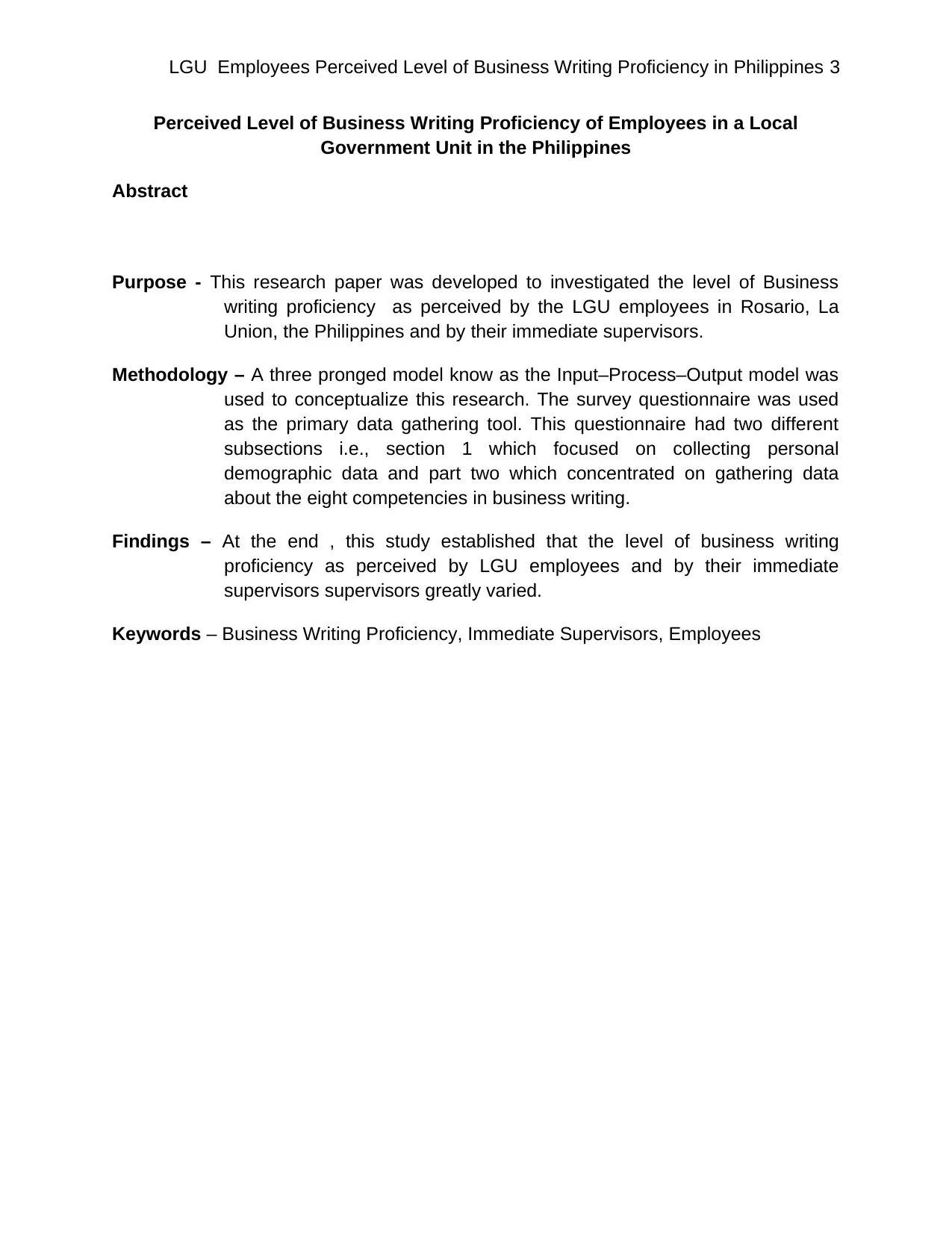
LGU Employees Perceived Level of Business Writing Proficiency in Philippines 3
Perceived Level of Business Writing Proficiency of Employees in a Local
Government Unit in the Philippines
Abstract
Purpose - This research paper was developed to investigated the level of Business
writing proficiency as perceived by the LGU employees in Rosario, La
Union, the Philippines and by their immediate supervisors.
Methodology – A three pronged model know as the Input–Process–Output model was
used to conceptualize this research. The survey questionnaire was used
as the primary data gathering tool. This questionnaire had two different
subsections i.e., section 1 which focused on collecting personal
demographic data and part two which concentrated on gathering data
about the eight competencies in business writing.
Findings – At the end , this study established that the level of business writing
proficiency as perceived by LGU employees and by their immediate
supervisors supervisors greatly varied.
Keywords – Business Writing Proficiency, Immediate Supervisors, Employees
Perceived Level of Business Writing Proficiency of Employees in a Local
Government Unit in the Philippines
Abstract
Purpose - This research paper was developed to investigated the level of Business
writing proficiency as perceived by the LGU employees in Rosario, La
Union, the Philippines and by their immediate supervisors.
Methodology – A three pronged model know as the Input–Process–Output model was
used to conceptualize this research. The survey questionnaire was used
as the primary data gathering tool. This questionnaire had two different
subsections i.e., section 1 which focused on collecting personal
demographic data and part two which concentrated on gathering data
about the eight competencies in business writing.
Findings – At the end , this study established that the level of business writing
proficiency as perceived by LGU employees and by their immediate
supervisors supervisors greatly varied.
Keywords – Business Writing Proficiency, Immediate Supervisors, Employees
⊘ This is a preview!⊘
Do you want full access?
Subscribe today to unlock all pages.

Trusted by 1+ million students worldwide
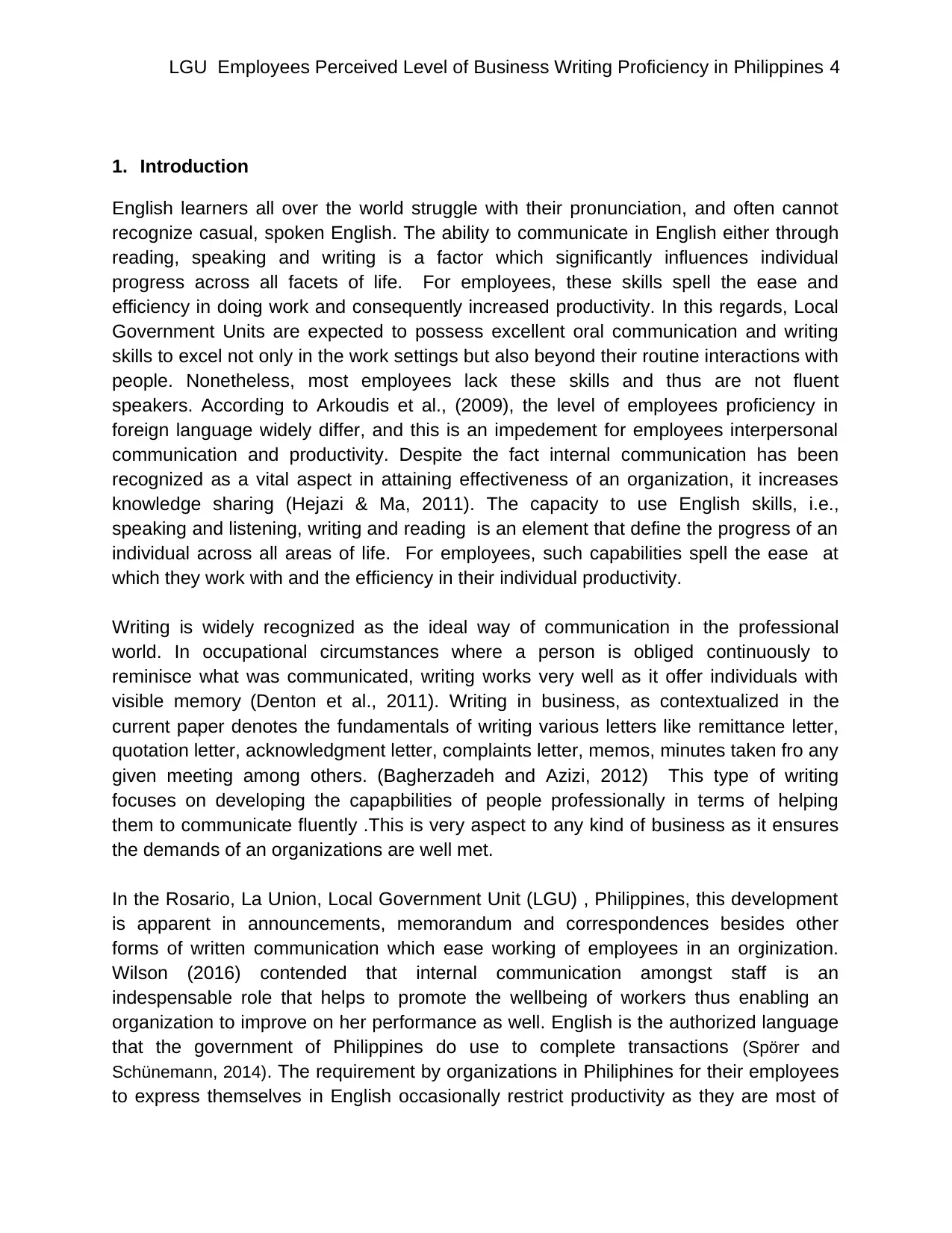
LGU Employees Perceived Level of Business Writing Proficiency in Philippines 4
1. Introduction
English learners all over the world struggle with their pronunciation, and often cannot
recognize casual, spoken English. The ability to communicate in English either through
reading, speaking and writing is a factor which significantly influences individual
progress across all facets of life. For employees, these skills spell the ease and
efficiency in doing work and consequently increased productivity. In this regards, Local
Government Units are expected to possess excellent oral communication and writing
skills to excel not only in the work settings but also beyond their routine interactions with
people. Nonetheless, most employees lack these skills and thus are not fluent
speakers. According to Arkoudis et al., (2009), the level of employees proficiency in
foreign language widely differ, and this is an impedement for employees interpersonal
communication and productivity. Despite the fact internal communication has been
recognized as a vital aspect in attaining effectiveness of an organization, it increases
knowledge sharing (Hejazi & Ma, 2011). The capacity to use English skills, i.e.,
speaking and listening, writing and reading is an element that define the progress of an
individual across all areas of life. For employees, such capabilities spell the ease at
which they work with and the efficiency in their individual productivity.
Writing is widely recognized as the ideal way of communication in the professional
world. In occupational circumstances where a person is obliged continuously to
reminisce what was communicated, writing works very well as it offer individuals with
visible memory (Denton et al., 2011). Writing in business, as contextualized in the
current paper denotes the fundamentals of writing various letters like remittance letter,
quotation letter, acknowledgment letter, complaints letter, memos, minutes taken fro any
given meeting among others. (Bagherzadeh and Azizi, 2012) This type of writing
focuses on developing the capapbilities of people professionally in terms of helping
them to communicate fluently .This is very aspect to any kind of business as it ensures
the demands of an organizations are well met.
In the Rosario, La Union, Local Government Unit (LGU) , Philippines, this development
is apparent in announcements, memorandum and correspondences besides other
forms of written communication which ease working of employees in an orginization.
Wilson (2016) contended that internal communication amongst staff is an
indespensable role that helps to promote the wellbeing of workers thus enabling an
organization to improve on her performance as well. English is the authorized language
that the government of Philippines do use to complete transactions (Spörer and
Schünemann, 2014). The requirement by organizations in Philiphines for their employees
to express themselves in English occasionally restrict productivity as they are most of
1. Introduction
English learners all over the world struggle with their pronunciation, and often cannot
recognize casual, spoken English. The ability to communicate in English either through
reading, speaking and writing is a factor which significantly influences individual
progress across all facets of life. For employees, these skills spell the ease and
efficiency in doing work and consequently increased productivity. In this regards, Local
Government Units are expected to possess excellent oral communication and writing
skills to excel not only in the work settings but also beyond their routine interactions with
people. Nonetheless, most employees lack these skills and thus are not fluent
speakers. According to Arkoudis et al., (2009), the level of employees proficiency in
foreign language widely differ, and this is an impedement for employees interpersonal
communication and productivity. Despite the fact internal communication has been
recognized as a vital aspect in attaining effectiveness of an organization, it increases
knowledge sharing (Hejazi & Ma, 2011). The capacity to use English skills, i.e.,
speaking and listening, writing and reading is an element that define the progress of an
individual across all areas of life. For employees, such capabilities spell the ease at
which they work with and the efficiency in their individual productivity.
Writing is widely recognized as the ideal way of communication in the professional
world. In occupational circumstances where a person is obliged continuously to
reminisce what was communicated, writing works very well as it offer individuals with
visible memory (Denton et al., 2011). Writing in business, as contextualized in the
current paper denotes the fundamentals of writing various letters like remittance letter,
quotation letter, acknowledgment letter, complaints letter, memos, minutes taken fro any
given meeting among others. (Bagherzadeh and Azizi, 2012) This type of writing
focuses on developing the capapbilities of people professionally in terms of helping
them to communicate fluently .This is very aspect to any kind of business as it ensures
the demands of an organizations are well met.
In the Rosario, La Union, Local Government Unit (LGU) , Philippines, this development
is apparent in announcements, memorandum and correspondences besides other
forms of written communication which ease working of employees in an orginization.
Wilson (2016) contended that internal communication amongst staff is an
indespensable role that helps to promote the wellbeing of workers thus enabling an
organization to improve on her performance as well. English is the authorized language
that the government of Philippines do use to complete transactions (Spörer and
Schünemann, 2014). The requirement by organizations in Philiphines for their employees
to express themselves in English occasionally restrict productivity as they are most of
Paraphrase This Document
Need a fresh take? Get an instant paraphrase of this document with our AI Paraphraser
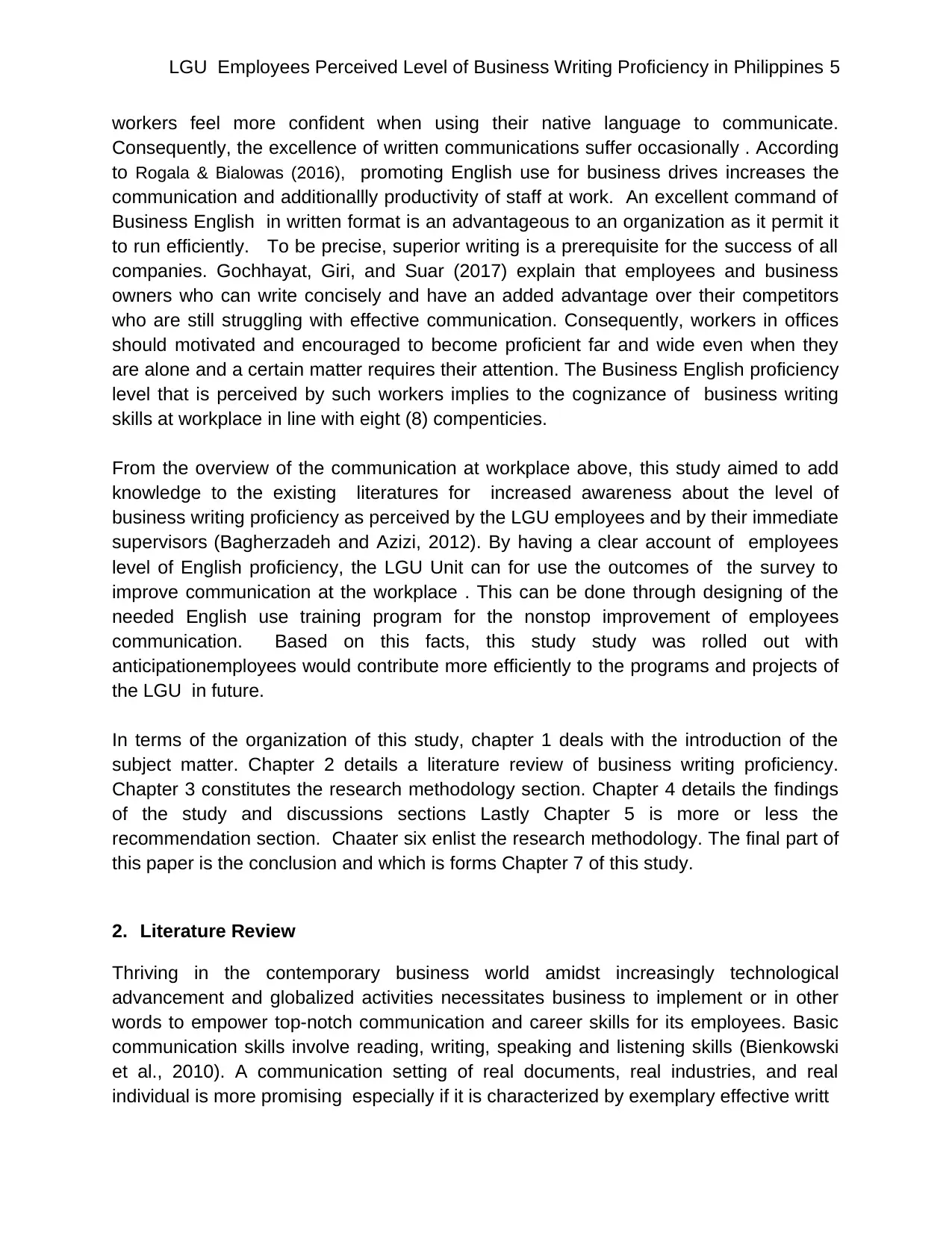
LGU Employees Perceived Level of Business Writing Proficiency in Philippines 5
workers feel more confident when using their native language to communicate.
Consequently, the excellence of written communications suffer occasionally . According
to Rogala & Bialowas (2016), promoting English use for business drives increases the
communication and additionallly productivity of staff at work. An excellent command of
Business English in written format is an advantageous to an organization as it permit it
to run efficiently. To be precise, superior writing is a prerequisite for the success of all
companies. Gochhayat, Giri, and Suar (2017) explain that employees and business
owners who can write concisely and have an added advantage over their competitors
who are still struggling with effective communication. Consequently, workers in offices
should motivated and encouraged to become proficient far and wide even when they
are alone and a certain matter requires their attention. The Business English proficiency
level that is perceived by such workers implies to the cognizance of business writing
skills at workplace in line with eight (8) compenticies.
From the overview of the communication at workplace above, this study aimed to add
knowledge to the existing literatures for increased awareness about the level of
business writing proficiency as perceived by the LGU employees and by their immediate
supervisors (Bagherzadeh and Azizi, 2012). By having a clear account of employees
level of English proficiency, the LGU Unit can for use the outcomes of the survey to
improve communication at the workplace . This can be done through designing of the
needed English use training program for the nonstop improvement of employees
communication. Based on this facts, this study study was rolled out with
anticipationemployees would contribute more efficiently to the programs and projects of
the LGU in future.
In terms of the organization of this study, chapter 1 deals with the introduction of the
subject matter. Chapter 2 details a literature review of business writing proficiency.
Chapter 3 constitutes the research methodology section. Chapter 4 details the findings
of the study and discussions sections Lastly Chapter 5 is more or less the
recommendation section. Chaater six enlist the research methodology. The final part of
this paper is the conclusion and which is forms Chapter 7 of this study.
2. Literature Review
Thriving in the contemporary business world amidst increasingly technological
advancement and globalized activities necessitates business to implement or in other
words to empower top-notch communication and career skills for its employees. Basic
communication skills involve reading, writing, speaking and listening skills (Bienkowski
et al., 2010). A communication setting of real documents, real industries, and real
individual is more promising especially if it is characterized by exemplary effective writt
workers feel more confident when using their native language to communicate.
Consequently, the excellence of written communications suffer occasionally . According
to Rogala & Bialowas (2016), promoting English use for business drives increases the
communication and additionallly productivity of staff at work. An excellent command of
Business English in written format is an advantageous to an organization as it permit it
to run efficiently. To be precise, superior writing is a prerequisite for the success of all
companies. Gochhayat, Giri, and Suar (2017) explain that employees and business
owners who can write concisely and have an added advantage over their competitors
who are still struggling with effective communication. Consequently, workers in offices
should motivated and encouraged to become proficient far and wide even when they
are alone and a certain matter requires their attention. The Business English proficiency
level that is perceived by such workers implies to the cognizance of business writing
skills at workplace in line with eight (8) compenticies.
From the overview of the communication at workplace above, this study aimed to add
knowledge to the existing literatures for increased awareness about the level of
business writing proficiency as perceived by the LGU employees and by their immediate
supervisors (Bagherzadeh and Azizi, 2012). By having a clear account of employees
level of English proficiency, the LGU Unit can for use the outcomes of the survey to
improve communication at the workplace . This can be done through designing of the
needed English use training program for the nonstop improvement of employees
communication. Based on this facts, this study study was rolled out with
anticipationemployees would contribute more efficiently to the programs and projects of
the LGU in future.
In terms of the organization of this study, chapter 1 deals with the introduction of the
subject matter. Chapter 2 details a literature review of business writing proficiency.
Chapter 3 constitutes the research methodology section. Chapter 4 details the findings
of the study and discussions sections Lastly Chapter 5 is more or less the
recommendation section. Chaater six enlist the research methodology. The final part of
this paper is the conclusion and which is forms Chapter 7 of this study.
2. Literature Review
Thriving in the contemporary business world amidst increasingly technological
advancement and globalized activities necessitates business to implement or in other
words to empower top-notch communication and career skills for its employees. Basic
communication skills involve reading, writing, speaking and listening skills (Bienkowski
et al., 2010). A communication setting of real documents, real industries, and real
individual is more promising especially if it is characterized by exemplary effective writt
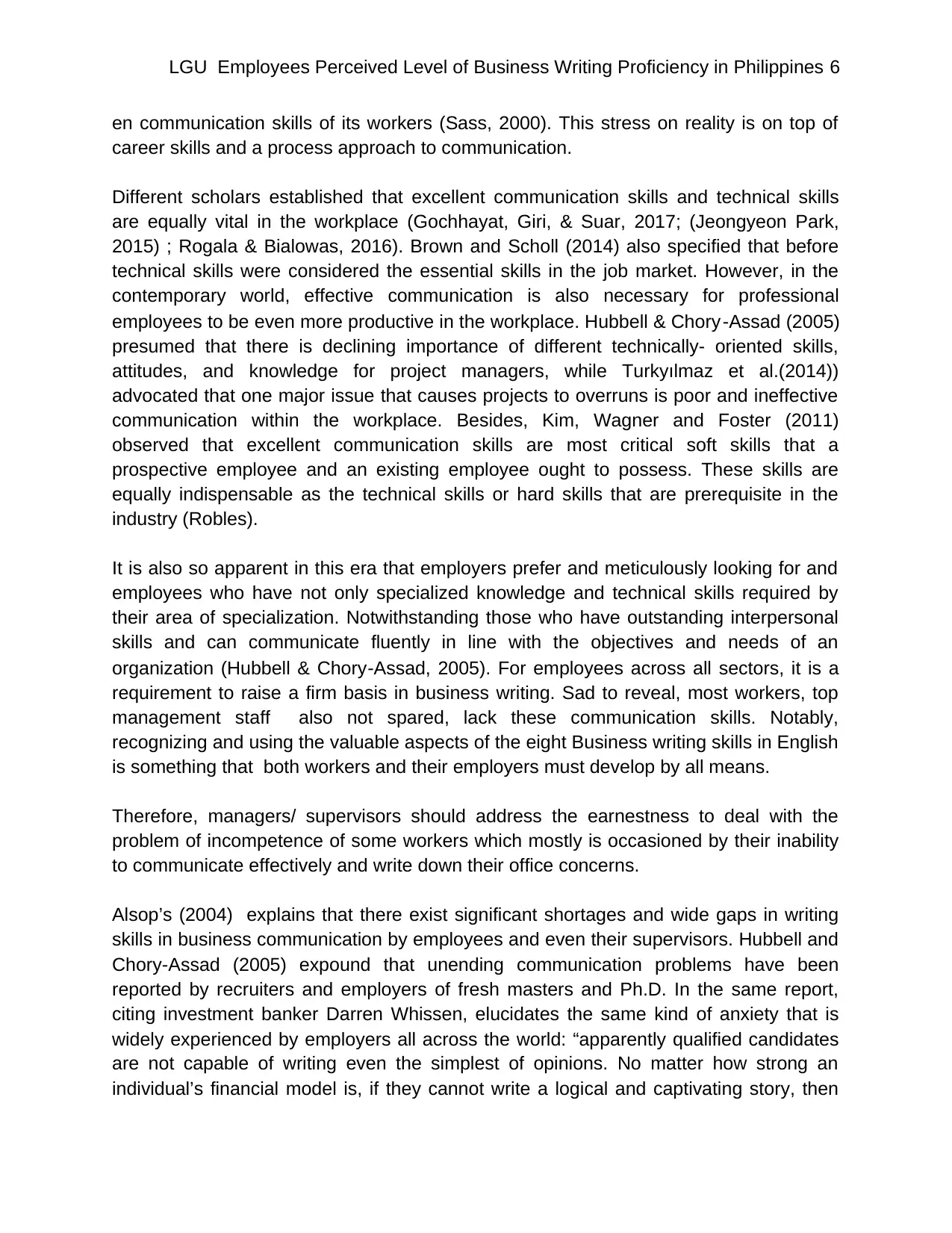
LGU Employees Perceived Level of Business Writing Proficiency in Philippines 6
en communication skills of its workers (Sass, 2000). This stress on reality is on top of
career skills and a process approach to communication.
Different scholars established that excellent communication skills and technical skills
are equally vital in the workplace (Gochhayat, Giri, & Suar, 2017; (Jeongyeon Park,
2015) ; Rogala & Bialowas, 2016). Brown and Scholl (2014) also specified that before
technical skills were considered the essential skills in the job market. However, in the
contemporary world, effective communication is also necessary for professional
employees to be even more productive in the workplace. Hubbell & Chory‐Assad (2005)
presumed that there is declining importance of different technically- oriented skills,
attitudes, and knowledge for project managers, while Turkyılmaz et al.(2014))
advocated that one major issue that causes projects to overruns is poor and ineffective
communication within the workplace. Besides, Kim, Wagner and Foster (2011)
observed that excellent communication skills are most critical soft skills that a
prospective employee and an existing employee ought to possess. These skills are
equally indispensable as the technical skills or hard skills that are prerequisite in the
industry (Robles).
It is also so apparent in this era that employers prefer and meticulously looking for and
employees who have not only specialized knowledge and technical skills required by
their area of specialization. Notwithstanding those who have outstanding interpersonal
skills and can communicate fluently in line with the objectives and needs of an
organization (Hubbell & Chory‐Assad, 2005). For employees across all sectors, it is a
requirement to raise a firm basis in business writing. Sad to reveal, most workers, top
management staff also not spared, lack these communication skills. Notably,
recognizing and using the valuable aspects of the eight Business writing skills in English
is something that both workers and their employers must develop by all means.
Therefore, managers/ supervisors should address the earnestness to deal with the
problem of incompetence of some workers which mostly is occasioned by their inability
to communicate effectively and write down their office concerns.
Alsop’s (2004) explains that there exist significant shortages and wide gaps in writing
skills in business communication by employees and even their supervisors. Hubbell and
Chory‐Assad (2005) expound that unending communication problems have been
reported by recruiters and employers of fresh masters and Ph.D. In the same report,
citing investment banker Darren Whissen, elucidates the same kind of anxiety that is
widely experienced by employers all across the world: “apparently qualified candidates
are not capable of writing even the simplest of opinions. No matter how strong an
individual’s financial model is, if they cannot write a logical and captivating story, then
en communication skills of its workers (Sass, 2000). This stress on reality is on top of
career skills and a process approach to communication.
Different scholars established that excellent communication skills and technical skills
are equally vital in the workplace (Gochhayat, Giri, & Suar, 2017; (Jeongyeon Park,
2015) ; Rogala & Bialowas, 2016). Brown and Scholl (2014) also specified that before
technical skills were considered the essential skills in the job market. However, in the
contemporary world, effective communication is also necessary for professional
employees to be even more productive in the workplace. Hubbell & Chory‐Assad (2005)
presumed that there is declining importance of different technically- oriented skills,
attitudes, and knowledge for project managers, while Turkyılmaz et al.(2014))
advocated that one major issue that causes projects to overruns is poor and ineffective
communication within the workplace. Besides, Kim, Wagner and Foster (2011)
observed that excellent communication skills are most critical soft skills that a
prospective employee and an existing employee ought to possess. These skills are
equally indispensable as the technical skills or hard skills that are prerequisite in the
industry (Robles).
It is also so apparent in this era that employers prefer and meticulously looking for and
employees who have not only specialized knowledge and technical skills required by
their area of specialization. Notwithstanding those who have outstanding interpersonal
skills and can communicate fluently in line with the objectives and needs of an
organization (Hubbell & Chory‐Assad, 2005). For employees across all sectors, it is a
requirement to raise a firm basis in business writing. Sad to reveal, most workers, top
management staff also not spared, lack these communication skills. Notably,
recognizing and using the valuable aspects of the eight Business writing skills in English
is something that both workers and their employers must develop by all means.
Therefore, managers/ supervisors should address the earnestness to deal with the
problem of incompetence of some workers which mostly is occasioned by their inability
to communicate effectively and write down their office concerns.
Alsop’s (2004) explains that there exist significant shortages and wide gaps in writing
skills in business communication by employees and even their supervisors. Hubbell and
Chory‐Assad (2005) expound that unending communication problems have been
reported by recruiters and employers of fresh masters and Ph.D. In the same report,
citing investment banker Darren Whissen, elucidates the same kind of anxiety that is
widely experienced by employers all across the world: “apparently qualified candidates
are not capable of writing even the simplest of opinions. No matter how strong an
individual’s financial model is, if they cannot write a logical and captivating story, then
⊘ This is a preview!⊘
Do you want full access?
Subscribe today to unlock all pages.

Trusted by 1+ million students worldwide
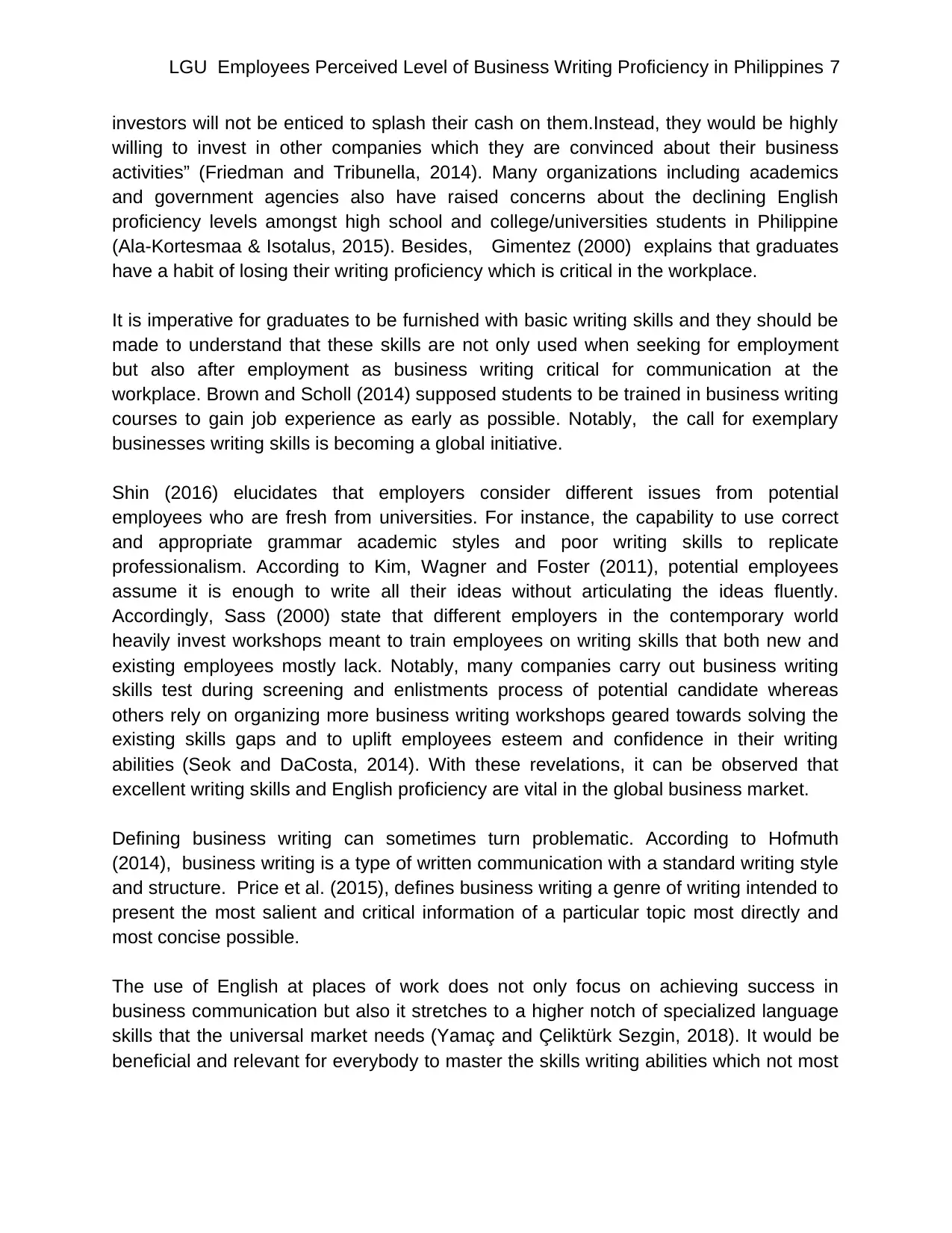
LGU Employees Perceived Level of Business Writing Proficiency in Philippines 7
investors will not be enticed to splash their cash on them.Instead, they would be highly
willing to invest in other companies which they are convinced about their business
activities” (Friedman and Tribunella, 2014). Many organizations including academics
and government agencies also have raised concerns about the declining English
proficiency levels amongst high school and college/universities students in Philippine
(Ala-Kortesmaa & Isotalus, 2015). Besides, Gimentez (2000) explains that graduates
have a habit of losing their writing proficiency which is critical in the workplace.
It is imperative for graduates to be furnished with basic writing skills and they should be
made to understand that these skills are not only used when seeking for employment
but also after employment as business writing critical for communication at the
workplace. Brown and Scholl (2014) supposed students to be trained in business writing
courses to gain job experience as early as possible. Notably, the call for exemplary
businesses writing skills is becoming a global initiative.
Shin (2016) elucidates that employers consider different issues from potential
employees who are fresh from universities. For instance, the capability to use correct
and appropriate grammar academic styles and poor writing skills to replicate
professionalism. According to Kim, Wagner and Foster (2011), potential employees
assume it is enough to write all their ideas without articulating the ideas fluently.
Accordingly, Sass (2000) state that different employers in the contemporary world
heavily invest workshops meant to train employees on writing skills that both new and
existing employees mostly lack. Notably, many companies carry out business writing
skills test during screening and enlistments process of potential candidate whereas
others rely on organizing more business writing workshops geared towards solving the
existing skills gaps and to uplift employees esteem and confidence in their writing
abilities (Seok and DaCosta, 2014). With these revelations, it can be observed that
excellent writing skills and English proficiency are vital in the global business market.
Defining business writing can sometimes turn problematic. According to Hofmuth
(2014), business writing is a type of written communication with a standard writing style
and structure. Price et al. (2015), defines business writing a genre of writing intended to
present the most salient and critical information of a particular topic most directly and
most concise possible.
The use of English at places of work does not only focus on achieving success in
business communication but also it stretches to a higher notch of specialized language
skills that the universal market needs (Yamaç and Çeliktürk Sezgin, 2018). It would be
beneficial and relevant for everybody to master the skills writing abilities which not most
investors will not be enticed to splash their cash on them.Instead, they would be highly
willing to invest in other companies which they are convinced about their business
activities” (Friedman and Tribunella, 2014). Many organizations including academics
and government agencies also have raised concerns about the declining English
proficiency levels amongst high school and college/universities students in Philippine
(Ala-Kortesmaa & Isotalus, 2015). Besides, Gimentez (2000) explains that graduates
have a habit of losing their writing proficiency which is critical in the workplace.
It is imperative for graduates to be furnished with basic writing skills and they should be
made to understand that these skills are not only used when seeking for employment
but also after employment as business writing critical for communication at the
workplace. Brown and Scholl (2014) supposed students to be trained in business writing
courses to gain job experience as early as possible. Notably, the call for exemplary
businesses writing skills is becoming a global initiative.
Shin (2016) elucidates that employers consider different issues from potential
employees who are fresh from universities. For instance, the capability to use correct
and appropriate grammar academic styles and poor writing skills to replicate
professionalism. According to Kim, Wagner and Foster (2011), potential employees
assume it is enough to write all their ideas without articulating the ideas fluently.
Accordingly, Sass (2000) state that different employers in the contemporary world
heavily invest workshops meant to train employees on writing skills that both new and
existing employees mostly lack. Notably, many companies carry out business writing
skills test during screening and enlistments process of potential candidate whereas
others rely on organizing more business writing workshops geared towards solving the
existing skills gaps and to uplift employees esteem and confidence in their writing
abilities (Seok and DaCosta, 2014). With these revelations, it can be observed that
excellent writing skills and English proficiency are vital in the global business market.
Defining business writing can sometimes turn problematic. According to Hofmuth
(2014), business writing is a type of written communication with a standard writing style
and structure. Price et al. (2015), defines business writing a genre of writing intended to
present the most salient and critical information of a particular topic most directly and
most concise possible.
The use of English at places of work does not only focus on achieving success in
business communication but also it stretches to a higher notch of specialized language
skills that the universal market needs (Yamaç and Çeliktürk Sezgin, 2018). It would be
beneficial and relevant for everybody to master the skills writing abilities which not most
Paraphrase This Document
Need a fresh take? Get an instant paraphrase of this document with our AI Paraphraser
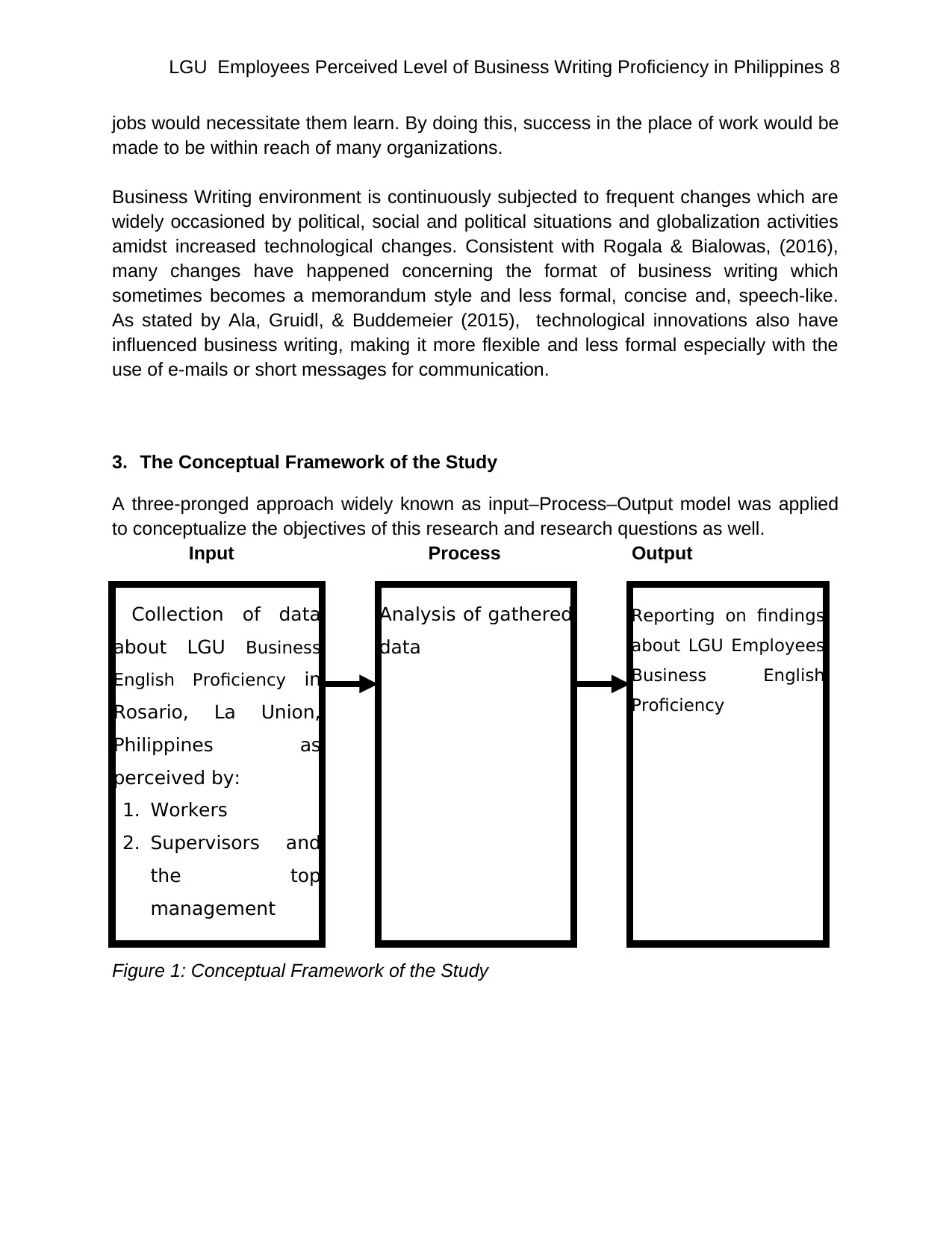
LGU Employees Perceived Level of Business Writing Proficiency in Philippines 8
jobs would necessitate them learn. By doing this, success in the place of work would be
made to be within reach of many organizations.
Business Writing environment is continuously subjected to frequent changes which are
widely occasioned by political, social and political situations and globalization activities
amidst increased technological changes. Consistent with Rogala & Bialowas, (2016),
many changes have happened concerning the format of business writing which
sometimes becomes a memorandum style and less formal, concise and, speech-like.
As stated by Ala, Gruidl, & Buddemeier (2015), technological innovations also have
influenced business writing, making it more flexible and less formal especially with the
use of e-mails or short messages for communication.
3. The Conceptual Framework of the Study
A three-pronged approach widely known as input–Process–Output model was applied
to conceptualize the objectives of this research and research questions as well.
Input Process Output
Figure 1: Conceptual Framework of the Study
Collection of data
about LGU Business
English Proficiency in
Rosario, La Union,
Philippines as
perceived by:
1. Workers
2. Supervisors and
the top
management
Reporting on findings
about LGU Employees
Business English
Proficiency
Analysis of gathered
data
jobs would necessitate them learn. By doing this, success in the place of work would be
made to be within reach of many organizations.
Business Writing environment is continuously subjected to frequent changes which are
widely occasioned by political, social and political situations and globalization activities
amidst increased technological changes. Consistent with Rogala & Bialowas, (2016),
many changes have happened concerning the format of business writing which
sometimes becomes a memorandum style and less formal, concise and, speech-like.
As stated by Ala, Gruidl, & Buddemeier (2015), technological innovations also have
influenced business writing, making it more flexible and less formal especially with the
use of e-mails or short messages for communication.
3. The Conceptual Framework of the Study
A three-pronged approach widely known as input–Process–Output model was applied
to conceptualize the objectives of this research and research questions as well.
Input Process Output
Figure 1: Conceptual Framework of the Study
Collection of data
about LGU Business
English Proficiency in
Rosario, La Union,
Philippines as
perceived by:
1. Workers
2. Supervisors and
the top
management
Reporting on findings
about LGU Employees
Business English
Proficiency
Analysis of gathered
data
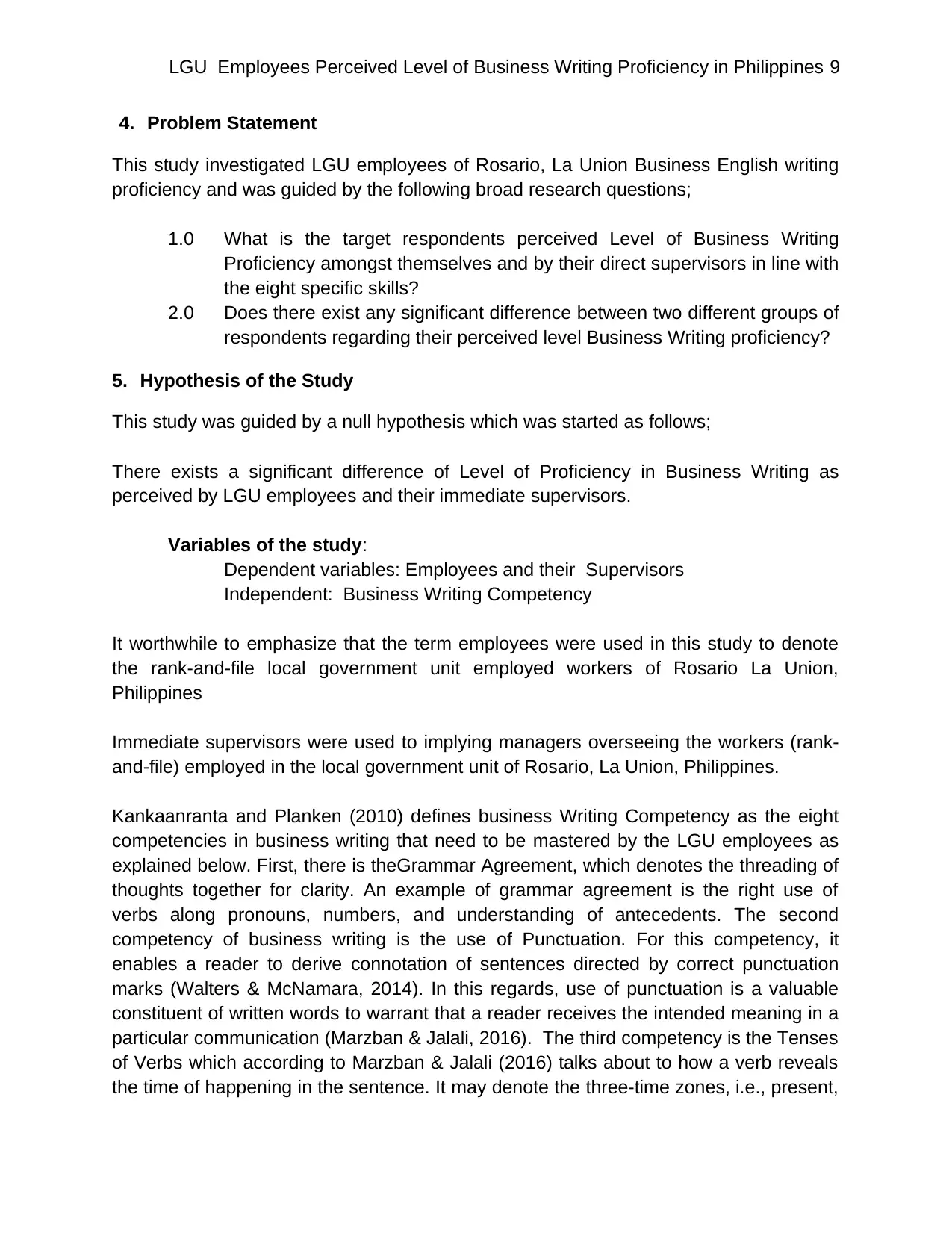
LGU Employees Perceived Level of Business Writing Proficiency in Philippines 9
4. Problem Statement
This study investigated LGU employees of Rosario, La Union Business English writing
proficiency and was guided by the following broad research questions;
1.0 What is the target respondents perceived Level of Business Writing
Proficiency amongst themselves and by their direct supervisors in line with
the eight specific skills?
2.0 Does there exist any significant difference between two different groups of
respondents regarding their perceived level Business Writing proficiency?
5. Hypothesis of the Study
This study was guided by a null hypothesis which was started as follows;
There exists a significant difference of Level of Proficiency in Business Writing as
perceived by LGU employees and their immediate supervisors.
Variables of the study:
Dependent variables: Employees and their Supervisors
Independent: Business Writing Competency
It worthwhile to emphasize that the term employees were used in this study to denote
the rank-and-file local government unit employed workers of Rosario La Union,
Philippines
Immediate supervisors were used to implying managers overseeing the workers (rank-
and-file) employed in the local government unit of Rosario, La Union, Philippines.
Kankaanranta and Planken (2010) defines business Writing Competency as the eight
competencies in business writing that need to be mastered by the LGU employees as
explained below. First, there is theGrammar Agreement, which denotes the threading of
thoughts together for clarity. An example of grammar agreement is the right use of
verbs along pronouns, numbers, and understanding of antecedents. The second
competency of business writing is the use of Punctuation. For this competency, it
enables a reader to derive connotation of sentences directed by correct punctuation
marks (Walters & McNamara, 2014). In this regards, use of punctuation is a valuable
constituent of written words to warrant that a reader receives the intended meaning in a
particular communication (Marzban & Jalali, 2016). The third competency is the Tenses
of Verbs which according to Marzban & Jalali (2016) talks about to how a verb reveals
the time of happening in the sentence. It may denote the three-time zones, i.e., present,
4. Problem Statement
This study investigated LGU employees of Rosario, La Union Business English writing
proficiency and was guided by the following broad research questions;
1.0 What is the target respondents perceived Level of Business Writing
Proficiency amongst themselves and by their direct supervisors in line with
the eight specific skills?
2.0 Does there exist any significant difference between two different groups of
respondents regarding their perceived level Business Writing proficiency?
5. Hypothesis of the Study
This study was guided by a null hypothesis which was started as follows;
There exists a significant difference of Level of Proficiency in Business Writing as
perceived by LGU employees and their immediate supervisors.
Variables of the study:
Dependent variables: Employees and their Supervisors
Independent: Business Writing Competency
It worthwhile to emphasize that the term employees were used in this study to denote
the rank-and-file local government unit employed workers of Rosario La Union,
Philippines
Immediate supervisors were used to implying managers overseeing the workers (rank-
and-file) employed in the local government unit of Rosario, La Union, Philippines.
Kankaanranta and Planken (2010) defines business Writing Competency as the eight
competencies in business writing that need to be mastered by the LGU employees as
explained below. First, there is theGrammar Agreement, which denotes the threading of
thoughts together for clarity. An example of grammar agreement is the right use of
verbs along pronouns, numbers, and understanding of antecedents. The second
competency of business writing is the use of Punctuation. For this competency, it
enables a reader to derive connotation of sentences directed by correct punctuation
marks (Walters & McNamara, 2014). In this regards, use of punctuation is a valuable
constituent of written words to warrant that a reader receives the intended meaning in a
particular communication (Marzban & Jalali, 2016). The third competency is the Tenses
of Verbs which according to Marzban & Jalali (2016) talks about to how a verb reveals
the time of happening in the sentence. It may denote the three-time zones, i.e., present,
⊘ This is a preview!⊘
Do you want full access?
Subscribe today to unlock all pages.

Trusted by 1+ million students worldwide
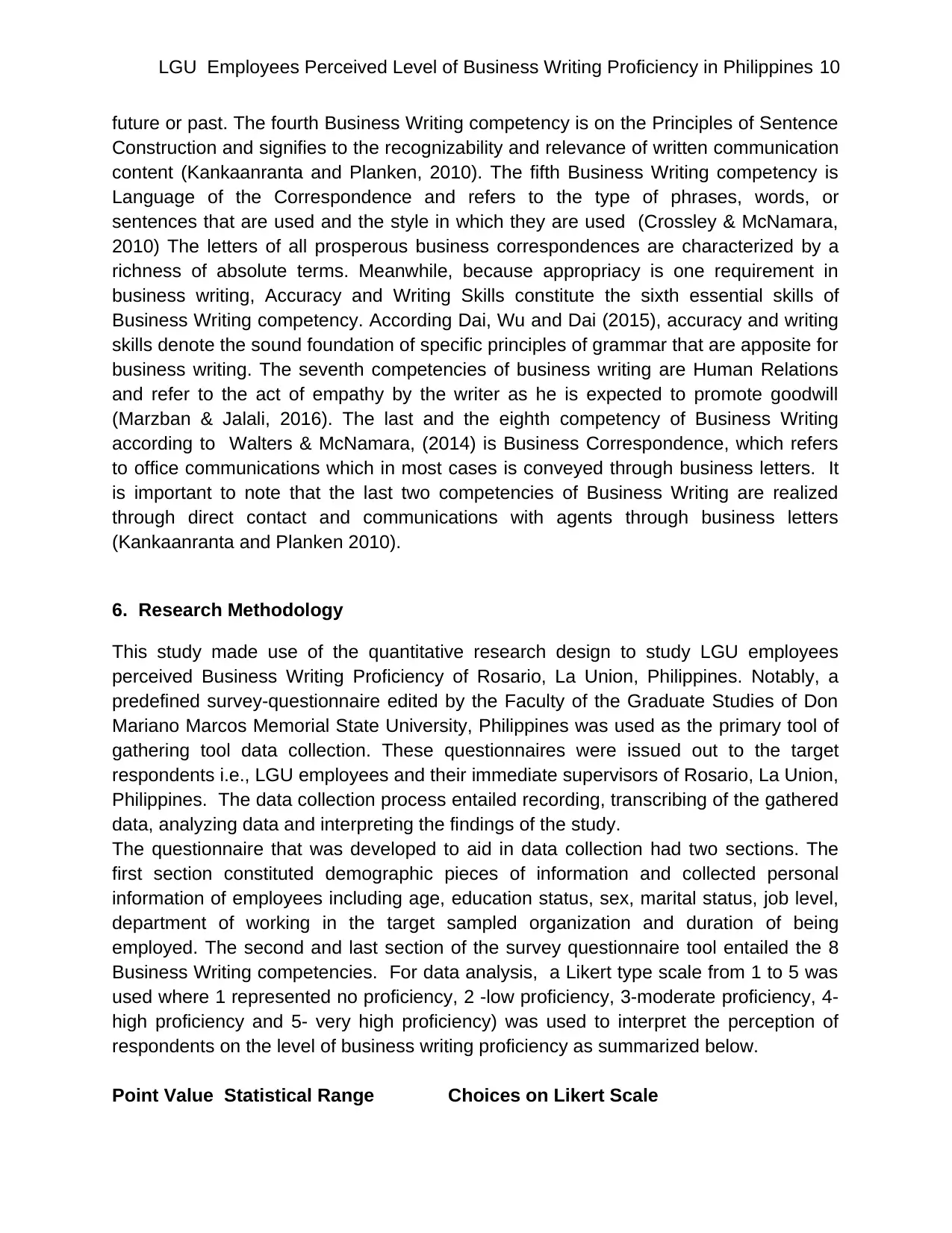
LGU Employees Perceived Level of Business Writing Proficiency in Philippines 10
future or past. The fourth Business Writing competency is on the Principles of Sentence
Construction and signifies to the recognizability and relevance of written communication
content (Kankaanranta and Planken, 2010). The fifth Business Writing competency is
Language of the Correspondence and refers to the type of phrases, words, or
sentences that are used and the style in which they are used (Crossley & McNamara,
2010) The letters of all prosperous business correspondences are characterized by a
richness of absolute terms. Meanwhile, because appropriacy is one requirement in
business writing, Accuracy and Writing Skills constitute the sixth essential skills of
Business Writing competency. According Dai, Wu and Dai (2015), accuracy and writing
skills denote the sound foundation of specific principles of grammar that are apposite for
business writing. The seventh competencies of business writing are Human Relations
and refer to the act of empathy by the writer as he is expected to promote goodwill
(Marzban & Jalali, 2016). The last and the eighth competency of Business Writing
according to Walters & McNamara, (2014) is Business Correspondence, which refers
to office communications which in most cases is conveyed through business letters. It
is important to note that the last two competencies of Business Writing are realized
through direct contact and communications with agents through business letters
(Kankaanranta and Planken 2010).
6. Research Methodology
This study made use of the quantitative research design to study LGU employees
perceived Business Writing Proficiency of Rosario, La Union, Philippines. Notably, a
predefined survey-questionnaire edited by the Faculty of the Graduate Studies of Don
Mariano Marcos Memorial State University, Philippines was used as the primary tool of
gathering tool data collection. These questionnaires were issued out to the target
respondents i.e., LGU employees and their immediate supervisors of Rosario, La Union,
Philippines. The data collection process entailed recording, transcribing of the gathered
data, analyzing data and interpreting the findings of the study.
The questionnaire that was developed to aid in data collection had two sections. The
first section constituted demographic pieces of information and collected personal
information of employees including age, education status, sex, marital status, job level,
department of working in the target sampled organization and duration of being
employed. The second and last section of the survey questionnaire tool entailed the 8
Business Writing competencies. For data analysis, a Likert type scale from 1 to 5 was
used where 1 represented no proficiency, 2 -low proficiency, 3-moderate proficiency, 4-
high proficiency and 5- very high proficiency) was used to interpret the perception of
respondents on the level of business writing proficiency as summarized below.
Point Value Statistical Range Choices on Likert Scale
future or past. The fourth Business Writing competency is on the Principles of Sentence
Construction and signifies to the recognizability and relevance of written communication
content (Kankaanranta and Planken, 2010). The fifth Business Writing competency is
Language of the Correspondence and refers to the type of phrases, words, or
sentences that are used and the style in which they are used (Crossley & McNamara,
2010) The letters of all prosperous business correspondences are characterized by a
richness of absolute terms. Meanwhile, because appropriacy is one requirement in
business writing, Accuracy and Writing Skills constitute the sixth essential skills of
Business Writing competency. According Dai, Wu and Dai (2015), accuracy and writing
skills denote the sound foundation of specific principles of grammar that are apposite for
business writing. The seventh competencies of business writing are Human Relations
and refer to the act of empathy by the writer as he is expected to promote goodwill
(Marzban & Jalali, 2016). The last and the eighth competency of Business Writing
according to Walters & McNamara, (2014) is Business Correspondence, which refers
to office communications which in most cases is conveyed through business letters. It
is important to note that the last two competencies of Business Writing are realized
through direct contact and communications with agents through business letters
(Kankaanranta and Planken 2010).
6. Research Methodology
This study made use of the quantitative research design to study LGU employees
perceived Business Writing Proficiency of Rosario, La Union, Philippines. Notably, a
predefined survey-questionnaire edited by the Faculty of the Graduate Studies of Don
Mariano Marcos Memorial State University, Philippines was used as the primary tool of
gathering tool data collection. These questionnaires were issued out to the target
respondents i.e., LGU employees and their immediate supervisors of Rosario, La Union,
Philippines. The data collection process entailed recording, transcribing of the gathered
data, analyzing data and interpreting the findings of the study.
The questionnaire that was developed to aid in data collection had two sections. The
first section constituted demographic pieces of information and collected personal
information of employees including age, education status, sex, marital status, job level,
department of working in the target sampled organization and duration of being
employed. The second and last section of the survey questionnaire tool entailed the 8
Business Writing competencies. For data analysis, a Likert type scale from 1 to 5 was
used where 1 represented no proficiency, 2 -low proficiency, 3-moderate proficiency, 4-
high proficiency and 5- very high proficiency) was used to interpret the perception of
respondents on the level of business writing proficiency as summarized below.
Point Value Statistical Range Choices on Likert Scale
Paraphrase This Document
Need a fresh take? Get an instant paraphrase of this document with our AI Paraphraser
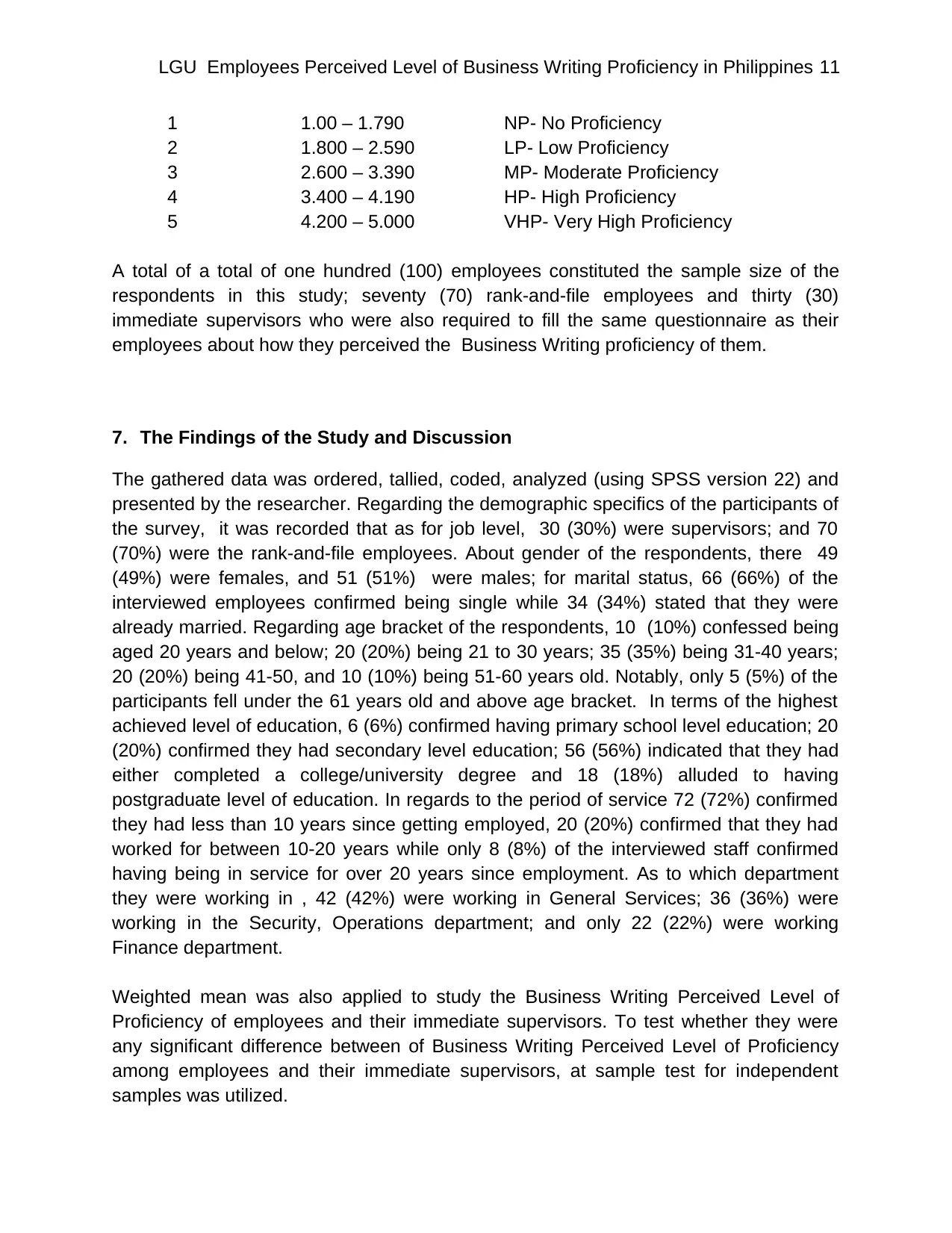
LGU Employees Perceived Level of Business Writing Proficiency in Philippines 11
1 1.00 – 1.790 NP- No Proficiency
2 1.800 – 2.590 LP- Low Proficiency
3 2.600 – 3.390 MP- Moderate Proficiency
4 3.400 – 4.190 HP- High Proficiency
5 4.200 – 5.000 VHP- Very High Proficiency
A total of a total of one hundred (100) employees constituted the sample size of the
respondents in this study; seventy (70) rank-and-file employees and thirty (30)
immediate supervisors who were also required to fill the same questionnaire as their
employees about how they perceived the Business Writing proficiency of them.
7. The Findings of the Study and Discussion
The gathered data was ordered, tallied, coded, analyzed (using SPSS version 22) and
presented by the researcher. Regarding the demographic specifics of the participants of
the survey, it was recorded that as for job level, 30 (30%) were supervisors; and 70
(70%) were the rank-and-file employees. About gender of the respondents, there 49
(49%) were females, and 51 (51%) were males; for marital status, 66 (66%) of the
interviewed employees confirmed being single while 34 (34%) stated that they were
already married. Regarding age bracket of the respondents, 10 (10%) confessed being
aged 20 years and below; 20 (20%) being 21 to 30 years; 35 (35%) being 31-40 years;
20 (20%) being 41-50, and 10 (10%) being 51-60 years old. Notably, only 5 (5%) of the
participants fell under the 61 years old and above age bracket. In terms of the highest
achieved level of education, 6 (6%) confirmed having primary school level education; 20
(20%) confirmed they had secondary level education; 56 (56%) indicated that they had
either completed a college/university degree and 18 (18%) alluded to having
postgraduate level of education. In regards to the period of service 72 (72%) confirmed
they had less than 10 years since getting employed, 20 (20%) confirmed that they had
worked for between 10-20 years while only 8 (8%) of the interviewed staff confirmed
having being in service for over 20 years since employment. As to which department
they were working in , 42 (42%) were working in General Services; 36 (36%) were
working in the Security, Operations department; and only 22 (22%) were working
Finance department.
Weighted mean was also applied to study the Business Writing Perceived Level of
Proficiency of employees and their immediate supervisors. To test whether they were
any significant difference between of Business Writing Perceived Level of Proficiency
among employees and their immediate supervisors, at sample test for independent
samples was utilized.
1 1.00 – 1.790 NP- No Proficiency
2 1.800 – 2.590 LP- Low Proficiency
3 2.600 – 3.390 MP- Moderate Proficiency
4 3.400 – 4.190 HP- High Proficiency
5 4.200 – 5.000 VHP- Very High Proficiency
A total of a total of one hundred (100) employees constituted the sample size of the
respondents in this study; seventy (70) rank-and-file employees and thirty (30)
immediate supervisors who were also required to fill the same questionnaire as their
employees about how they perceived the Business Writing proficiency of them.
7. The Findings of the Study and Discussion
The gathered data was ordered, tallied, coded, analyzed (using SPSS version 22) and
presented by the researcher. Regarding the demographic specifics of the participants of
the survey, it was recorded that as for job level, 30 (30%) were supervisors; and 70
(70%) were the rank-and-file employees. About gender of the respondents, there 49
(49%) were females, and 51 (51%) were males; for marital status, 66 (66%) of the
interviewed employees confirmed being single while 34 (34%) stated that they were
already married. Regarding age bracket of the respondents, 10 (10%) confessed being
aged 20 years and below; 20 (20%) being 21 to 30 years; 35 (35%) being 31-40 years;
20 (20%) being 41-50, and 10 (10%) being 51-60 years old. Notably, only 5 (5%) of the
participants fell under the 61 years old and above age bracket. In terms of the highest
achieved level of education, 6 (6%) confirmed having primary school level education; 20
(20%) confirmed they had secondary level education; 56 (56%) indicated that they had
either completed a college/university degree and 18 (18%) alluded to having
postgraduate level of education. In regards to the period of service 72 (72%) confirmed
they had less than 10 years since getting employed, 20 (20%) confirmed that they had
worked for between 10-20 years while only 8 (8%) of the interviewed staff confirmed
having being in service for over 20 years since employment. As to which department
they were working in , 42 (42%) were working in General Services; 36 (36%) were
working in the Security, Operations department; and only 22 (22%) were working
Finance department.
Weighted mean was also applied to study the Business Writing Perceived Level of
Proficiency of employees and their immediate supervisors. To test whether they were
any significant difference between of Business Writing Perceived Level of Proficiency
among employees and their immediate supervisors, at sample test for independent
samples was utilized.
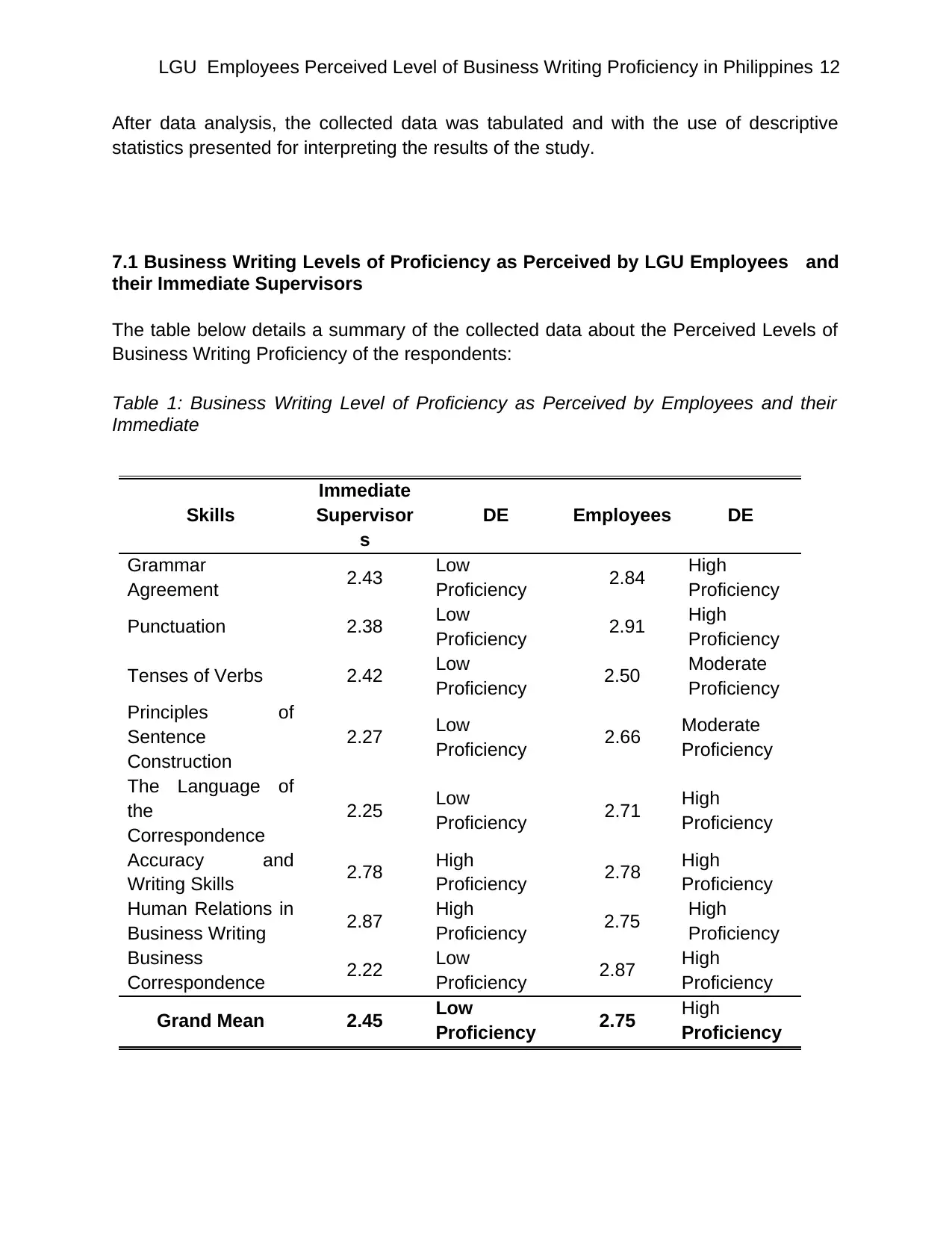
LGU Employees Perceived Level of Business Writing Proficiency in Philippines 12
After data analysis, the collected data was tabulated and with the use of descriptive
statistics presented for interpreting the results of the study.
7.1 Business Writing Levels of Proficiency as Perceived by LGU Employees and
their Immediate Supervisors
The table below details a summary of the collected data about the Perceived Levels of
Business Writing Proficiency of the respondents:
Table 1: Business Writing Level of Proficiency as Perceived by Employees and their
Immediate
Skills
Immediate
Supervisor
s
DE Employees DE
Grammar
Agreement 2.43 Low
Proficiency 2.84 High
Proficiency
Punctuation 2.38 Low
Proficiency 2.91 High
Proficiency
Tenses of Verbs 2.42 Low
Proficiency 2.50 Moderate
Proficiency
Principles of
Sentence
Construction
2.27 Low
Proficiency 2.66 Moderate
Proficiency
The Language of
the
Correspondence
2.25 Low
Proficiency 2.71 High
Proficiency
Accuracy and
Writing Skills 2.78 High
Proficiency 2.78 High
Proficiency
Human Relations in
Business Writing 2.87 High
Proficiency 2.75 High
Proficiency
Business
Correspondence 2.22 Low
Proficiency 2.87 High
Proficiency
Grand Mean 2.45 Low
Proficiency 2.75 High
Proficiency
After data analysis, the collected data was tabulated and with the use of descriptive
statistics presented for interpreting the results of the study.
7.1 Business Writing Levels of Proficiency as Perceived by LGU Employees and
their Immediate Supervisors
The table below details a summary of the collected data about the Perceived Levels of
Business Writing Proficiency of the respondents:
Table 1: Business Writing Level of Proficiency as Perceived by Employees and their
Immediate
Skills
Immediate
Supervisor
s
DE Employees DE
Grammar
Agreement 2.43 Low
Proficiency 2.84 High
Proficiency
Punctuation 2.38 Low
Proficiency 2.91 High
Proficiency
Tenses of Verbs 2.42 Low
Proficiency 2.50 Moderate
Proficiency
Principles of
Sentence
Construction
2.27 Low
Proficiency 2.66 Moderate
Proficiency
The Language of
the
Correspondence
2.25 Low
Proficiency 2.71 High
Proficiency
Accuracy and
Writing Skills 2.78 High
Proficiency 2.78 High
Proficiency
Human Relations in
Business Writing 2.87 High
Proficiency 2.75 High
Proficiency
Business
Correspondence 2.22 Low
Proficiency 2.87 High
Proficiency
Grand Mean 2.45 Low
Proficiency 2.75 High
Proficiency
⊘ This is a preview!⊘
Do you want full access?
Subscribe today to unlock all pages.

Trusted by 1+ million students worldwide
1 out of 33
Your All-in-One AI-Powered Toolkit for Academic Success.
+13062052269
info@desklib.com
Available 24*7 on WhatsApp / Email
![[object Object]](/_next/static/media/star-bottom.7253800d.svg)
Unlock your academic potential
Copyright © 2020–2026 A2Z Services. All Rights Reserved. Developed and managed by ZUCOL.